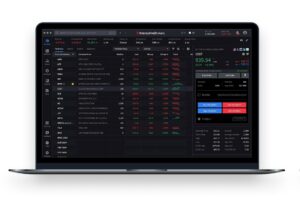Australia financial regulator ASIC has reported that the Australia Federal Court has unveiled another side of the bankruptcy of former AFS licensed CFDs broker USGFX, indicating that the “unconscionable conduct” that led to the demise of USGFX went well beyond its own four walls.
The 2020 bankruptcy of USGFX operator Union Standard International Group Pty Ltd, and subsequent disappearance of its controlling shareholder Soe Hein Minn, has not yet been resolved, with a staggering $357 million in client and creditor claims made against just $8 million in funds to distribute. Soe Hein Minn remains at large and in contempt of the courts in Australia.
Earlier this year ASIC banned EuropeFX director Pedro Sasso for five years from being a director of or controlling an entity that carries on a financial services business.
Now, the Australia Federal Court has found that USGFX and two of its former corporate authorised representatives, BrightAU Capital Pty Ltd (trading as TradeFred) and Maxi EFX Global AU Pty Ltd (trading as EuropeFX), engaged in systemic unconscionable conduct as well as a raft of other contraventions of the law between 2018 and 2020.
The Court heard that customers of EuropeFX and TradeFred lost over $83 million during the period of the extensive breaches of the law by these CFD issuers, including systemic unconscionable conduct, misleading and deceptive conduct and the provision of unlicensed personal advice. These companies directly profited from their customers’ losses and incentivised their account managers to pressure investors to deposit more funds. The onboarding processes of these companies actively sought to attract customers who were inexperienced or vulnerable. Many of these customers were ‘flying blind’ and did not understand the risks involved in these highly complex financial products.
In an Australian first, the Court also found that USGFX breached its general obligation to ensure that the financial services covered by its Australian financial services (AFS) license were provided ‘efficiently, honestly and fairly’, where it offered those services to customers in China, and it knew, or ought reasonably to have known, that those customers were likely be contravening Chinese law and it failed to take any reasonable steps to warn its customers that it was exposing them to potential civil and criminal liability in China. This judgment has important implications for entities providing financial services under an AFS license to customers outside of Australia. Justice Wigney held that the general obligations of AFS licensees are not limited to financial services provided to customers in Australia.
ASIC had warned CFD issuers in 2019 that ASIC would consider whether breaching overseas law is consistent with obligations under Australian law to provide services ‘efficiently, honestly and fairly’.
 ASIC Deputy Chair Sarah Court said,
ASIC Deputy Chair Sarah Court said,
“This outcome sets an important precedent for Australian based financial services licensees providing services such as margin forex trading to overseas customers under their AFS licence where such offerings are prohibited.
“The conduct of licensees providing services to overseas customers under their AFS licences has attracted considerable attention from regulators globally and this judgment is important in protecting the reputation of Australia’s financial services licencing regime.”
The Court found that EuropeFX and TradeFred employed a system of conduct and engaged in patterns of behaviour that were unconscionable as they:
- derived the bulk of their revenue from customers’ trading losses;
- provided a remuneration incentive to account managers to encourage and pressure customers to deposit more funds into their trading accounts;
- failed to address known misconduct by account managers;
- failed to give vulnerable customers any adequate explanations about the relevant financial products and the risks involved in trading in them;
- made misleading or deceptive representations, including about profits that could be generated;
- employed inappropriate, unfair or sharp practices;
- pressured vulnerable customers to trade and deposit more funds into their trading accounts, including encouraging customers to fund their trading through superannuation accounts or credit cards; and
- provided personal advice to their customers when they were not licensed to do so.
USG was held liable for this conduct as the AFS licensee holder who authorised them to operate.
Ms Court said,
“ASIC took this case to stand up for vulnerable consumers.
“Over a two-year period, USG and its authorised representatives downplayed the risk and overpromised profits of the high-risk CFD products.
“These entities profited from trades when their customers lost and EuropeFX attempted to argue this was not the case, which the Court firmly rejected.”
Account managers at EuropeFX and TradeFred reassured customers that its interests were aligned with that of its customers. However, the Court found that most customers lost money, and in up to 95% to 99% of cases. EuropeFX and TradeFred took the opposite position to customer trades, meaning that they profited when customers lost money on trades.
Justice Wigney stated,
“I have no hesitation in concluding that EuropeFX’s conduct was so far outside societal norms of acceptable behaviour in respect of the provision of financial services as to warrant condemnation as conduct that is offensive to conscience.”
The matter has been listed for a case management hearing on 19 February 2025.
USGFX and its former corporate authorised representatives, EuropeFX and TradeFred operated under USGFX’s AFS license 302792.
In December 2019, ASIC obtained asset restraint orders in the Federal Court against EuropeFX and TradeFred to protect customers’ funds while an investigation was underway. USGFX gave an undertaking to the Court to keep specified monetary amounts in a separate bank account (19-373MR). On 8 July 2020, USGFX entered into voluntary administration; liquidators were appointed on 3 September 2020. On 10 March 2020, TradeFred went into liquidation.
In July 2020, ASIC suspended the AFS license of USGFX and in September 2020, ASIC cancelled its AFS license (20-216MR).
ASIC commenced these proceedings against USGFX, TradeFred and EuropeFX in December 2020 (20-319MR).









